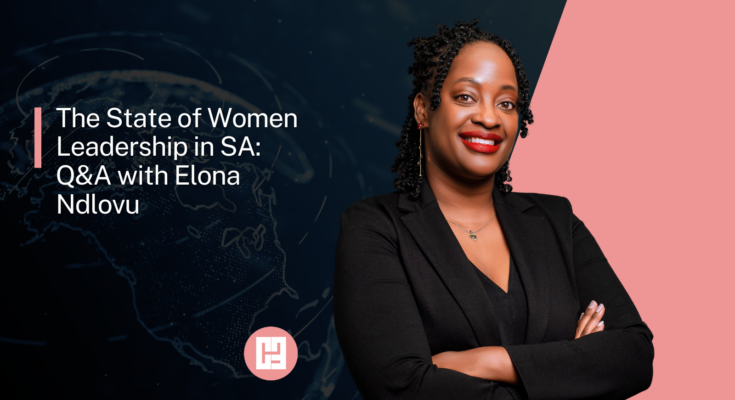I have young nieces that I hope will become leaders someday. Sometimes I wonder if the world will be ready to accept them as women leaders when they reach that stage. As this concern started to eat me up, I reached out to one of the most powerful women that I know, Elona Ndlovu, for a Q&A. She is an academic, an entrepreneur and a leader. I could not have chosen a better person. Here is the Q&A:
Sibusiso Nkosi: In your assessment, what is the state of women leadership in South Africa?
Elona Ndlovu: The state of women leadership in South Africa is undergoing positive transformation, yet challenges persist. Over the years, there has been a noticeable increase in the visibility of women in leadership roles, reflecting a gradual shift towards greater gender diversity. Women have made significant strides in various sectors, including politics, business, and civil society. Notable examples include the appointment of women to key ministerial positions, the rise of female CEOs in corporate entities such as Nompumelelo Zikhalala of Kumba Iron Ore, Mpumi Madisa of Bidvest, and the emergence of influential women leaders in activism and community development. In academia, we recently saw Nonkululeko Gobodo being awarded an honourary doctorate for her contribution and leadership in industry. These types of examples are encouraging for even the future generations. However, the progress made is not uniform across all sectors and levels of leadership. In certain industries, such as technology and finance, women still encounter barriers that hinder their progression to top-tier positions. Additionally, while there is increased representation in mid-level management, the pipeline to executive leadership roles remains a challenge. Factors such as gender stereotypes, unconscious biases, imposter syndrome, and systemic barriers contribute to the slower pace of achieving gender parity in leadership. It is essential to recognise these challenges and work collectively to address them to ensure sustained and widespread progress.
Sibusiso Nkosi: What strategies or policies can we use to advocate for more diversity and inclusion, especially when it comes to women in leadership?
Elona Ndlovu: To advocate for more diversity and inclusion, especially for women in leadership, implementing and promoting inclusive policies is crucial. This can include mentorship programs, gender-neutral recruitment processes, flexible work arrangements, and training programs that address unconscious biases. Additionally, creating a supportive workplace culture that values diversity and provides equal opportunities for career advancement is essential. Establish formal coaching and or mentorship programs that pair aspiring women leaders with experienced mentors who can provide guidance, share insights, and help navigate the challenges of leadership. Introduce sponsorship initiatives where senior leaders actively support and advocate for the career advancement of talented women within the organisation. Implement blind recruitment processes that remove identifying information, such as gender, from initial screening to mitigate unconscious biases. Ensure diverse hiring panels to minimise the impact of individual biases and promote fair assessment of candidates. We really need to be intentional in how we structure hiring panels from a DEI perspective, representation matters.
Sibusiso Nkosi: Based on previous employment equity reports, it seems like we have not made strides when it comes to women leadership in different institutions. In your view, why is that the case?
Elona Ndlovu: The lack of significant progress in women’s leadership roles in South Africa can be attributed to a complex interplay of cultural norms, deep-seated gender stereotypes, and systemic barriers ingrained within organisational structures. Despite positive strides in some sectors as mentioned earlier, traditional roles often influence decision-makers, perpetuating the underrepresentation of women in leadership. Resistance to change, a slow response to evolving norms, and insufficient representation in decision-making bodies further contribute to the stagnant pace of progress. Additionally, the failure to enforce existing policies promoting gender equity and address intersectionality exacerbates the issue. To counter pessimistic statements about women in leadership, it is essential to challenge stereotypes with evidence of successful women leaders, promote positive narratives, and advocate for systemic change. Encouraging education on systemic challenges and fostering supportive communities can empower individuals to actively participate in initiatives aimed at dismantling barriers and fostering a more inclusive environment for women in leadership.
Sibusiso Nkosi: I once heard a young woman say, women should be content with not being in leadership positions because the world is against them. How would you respond to a statement like that?
Elona Ndlovu: I think it is crucial to counter such negativity with a more constructive perspective, reframing this narrative. Rather than accepting defeat, we should rather challenge these statements by presenting evidence of successful women leaders who have defied societal norms and achieved significant milestones. This is why role models and representation are very important. Emphasising a positive narrative, promoting advocacy for change, and fostering a supportive community are essential components of this reframing. Encouraging education on systemic challenges and highlighting the business case for diversity can shift perspectives, demonstrating that gender equality in leadership is not only desirable but also beneficial for organisations and society at large. By empowering women and allies to be advocates for change, the conversation can be reframed from one of resignation to one of active participation in dismantling systemic barriers.
Sibusiso Nkosi: What is your message to women out there who are putting in the work and fetching those executive positions?
Elona Ndlovu: To the women putting in the work and aspiring to reach executive positions, my message is one of encouragement and resilience. Acknowledge and celebrate your achievements, as you contribute to breaking down barriers for future generations. Stay focused on your goals, build supportive networks, seek mentorship, and collaborate with other ambitious individuals. Remember that your capabilities are not confined by gender, and your unique contributions are invaluable to the success of organisations and society as a whole. By persistently pursuing your aspirations, you not only advance your own career but also contribute to a more inclusive and diverse leadership landscape. Your efforts are transformative, and through your achievements, you inspire positive change for women growing at various levels of leadership.
I really hope you were inspired by this! Feel free to drop a like below.
Do not forget to subscribe to our newsletter to have any new article sent to you directly! Sign up for free.




